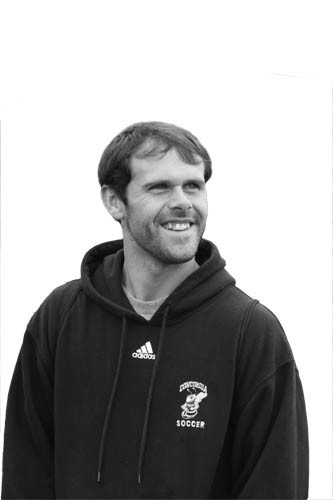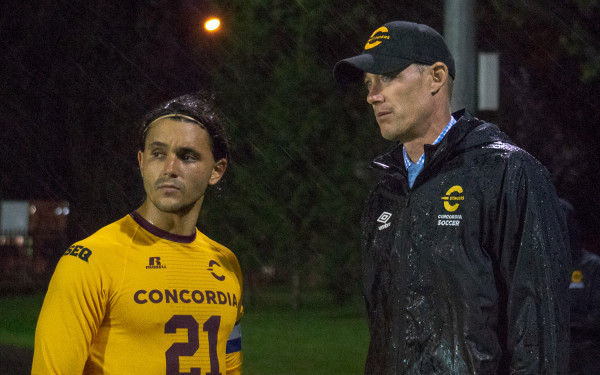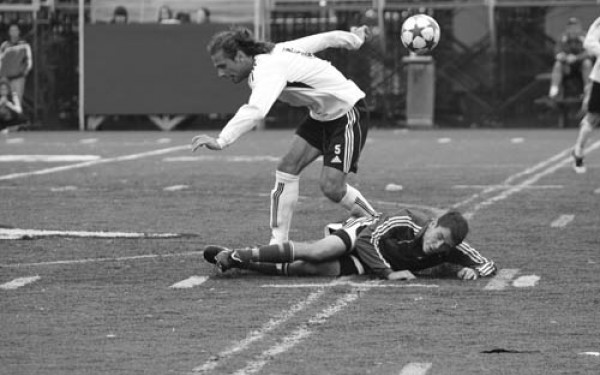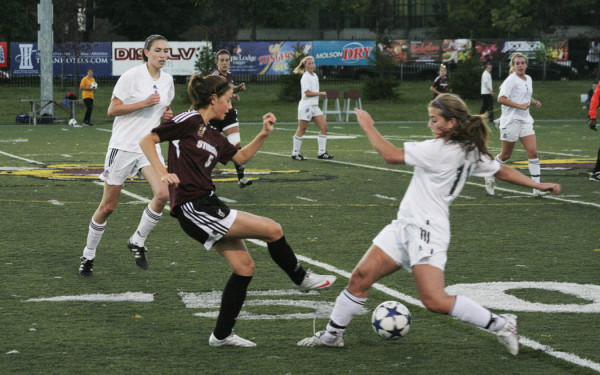Former Stingers Captain Moves to Coaching
Bryan Bourbonnais Talks About His Transition
After two years wearing the captain’s C on his uniform and five years playing for Concordia’s soccer team under coaches Lloyd Barker, Frank Bastien and Vladimir Pavlicik, Bryan Bourbonnais hung up the jersey and is now part of the coaching staff.
In a recent interview with The Link, the St. Hubert native took some time to reflect on his career and talk about his new position as a coach.
The Link: You played forward, defence and practically everything else for Concordia, so how has your experience as a player aided your understanding of the game as a coach?
Bryan Bourbonnais: That was one of the biggest influences for me wanting to become a coach. I think that because Lloyd, as well as Frank and Vladimir, taught me how to play in all these different positions, I feel confident enough to offer advice to the players. For example, one of our new recruits played centre-mid all of his life and Lloyd played him in the back in a 3-5-2 formation where all three players are supposed to be very experienced. So at halftime he would come up to me all confused and because I’ve been in that situation I knew how to fix the problem quickly without being too complex about it.
What’s it been like to coach alongside a former Impact great like Lloyd Barker?
For one, I think it’s a huge honour and privilege to coach alongside Barker, especially since I’ve never had any formal coaching experience other than coaching single-letter teams and teaching at soccer camps. Just for him to give me this opportunity is unbelievable. And I think playing under him first has made it a lot easier for me to coach with him, as I already sort of know what he expects.
What is your fondest memory playing for Concordia?
That’s a really tough question, because as a Stinger we never did very well in the standings. But if I really think about it, Concordia has had a lot of trouble in the past few years getting players who have an experienced background in AAA or university soccer. And one of my favourite things about playing for Barker was that he would take players who probably wouldn’t be picked by other universities and play them in a way where the game was so easy to understand.
He actually asked me this amazing thing once. He asked me, “How much time does a player actually touch the ball during a game?” and I answered with this number like 10 minutes, and he said, “Really? Think about it.” The ball actually touches my foot for maybe 20 seconds in a 90-minute game. So it actually doesn’t matter what you do with the ball, it’s what you do when you don’t have the ball that makes you a good soccer player.
What can you say about training camp this year that differs from past years?
Technically, I think the team has become a lot better. Last year by this time, we’d still have like 45 players still trying out for the team. But right now, Barker has his team.
There are places still available; there are still a lot of guys who are going to be trying out before the end of the season, but you can tell that Barker has put a lot of effort into building a base for his team.
Since you’ve played with some of the guys on the team, how has it been assessing their skill and the skills of some of the newer players breaking in?
That’s a really interesting thing. As the captain, I guess I was always sort of coaching anyway. But people are definitely coming to me more and asking for my input on what they need to do to make the team.
What do you see David Cerasuolo bringing to the table as the new captain?
We have very different styles in how we behave as captain. I’m much more verbal and more up front, while David is more humble. But I think Dave is going to be fantastic. You’ll hear him on the field and you can just tell that he has played at a very high level for the majority of his life.
You’ve had various leadership roles in your life and not just on the soccer pitch. Is there anything that you’ve learned from those experiences that can be applied to coaching?
Absolutely. For my entire life, I’ve always worked with children. I’ve managed a group home where I was basically a big brother to nine kids. So I guess I’ve just always been a big fan of teaching. Part of being a coach, or captain for that matter, is knowing how to teach people.
This article originally appeared in Volume 31, Issue 02, published August 24, 2010.






__600_375_90_s_c1.jpg)